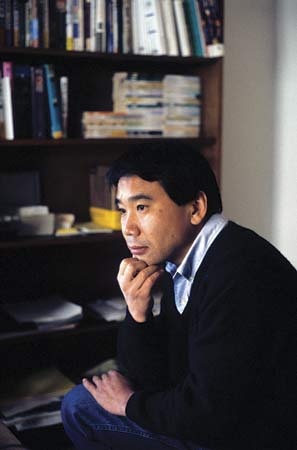Murakami Haruki
Japanese author
born Jan. 12, 1949, Kyōto, Japan
 the most widely translated Japanese novelist of his generation.
the most widely translated Japanese novelist of his generation.Murakami's first novel, Kaze no uta o kike (1979; Hear the Wind Sing), won a prize for best fiction by a new writer. From the start his writing was characterized by images and events that the author himself found difficult to explain but which seemed to come from the inner recesses of his memory. Some argued that this ambiguity, far from being off-putting, was one reason for his popularity with readers, especially young ones, who were bored with the self-confessions that formed the mainstream of contemporary Japanese literature. His perceived lack of a political or intellectual stance irritated “serious” authors (such as Ōe Kenzaburō), who dismissed his early writings as being no more than entertainment.
Murakami's first major international success came with Hitsuji o meguru bōken (1982; A Wild Sheep Chase), a novel that acquires an eerie quality from the mysterious sheep that comes to possess the narrator's friend, known as “the Rat.” The narrator and the Rat reappeared in Murakami's next important novel, Sekai no owari to hādoboirudo wandārando (1985; Hard-Boiled Wonderland and the End of the World), a fantasy that was successful with the public and was the winner of the prestigious Tanizaki Prize. One of Murakami's most ambitious novels, Nejimaki-dori kuronikuru (1994–95; The Wind-Up Bird Chronicle), represents a departure from his usual themes: it is devoted in part to depicting Japanese militarism on the Asian continent as a nightmare. Andāguraundo (1997; Underground) is a nonfiction account of the sarin gas attack carried out by the AUM Shinrikyo religious sect on a Tokyo subway in 1995.
The novel Supūtoniku no koibito (1999; Sputnik Sweetheart) probes the nature of love as it tells the story of the disappearance of Sumire, a young novelist. Subsequent novels include Umibe no Kafuka (2002; Kafka on the Shore) and Afutā dāku (2004; After Dark).
Several short-story collections, including Blind Willow, Sleeping Woman (2006), translate Murakami's stories into English. He also wrote a memoir, Hashiru koto ni tsuite kataru toki ni boku no kataru koto (2007; What I Talk About When I Talk About Running), which centres on his love for marathon running. An experienced translator of American literature, Murakami also published in Japanese editions of works by Raymond Carver (Carver, Raymond), Paul Theroux (Theroux, Paul), Truman Capote (Capote, Truman), Ursula K. Le Guin (Le Guin, Ursula K.), and J.D. Salinger (Salinger, J D).
- Menshikov, Aleksandr Sergeyevich, Knyaz
- mens rea
- menstruation
- mensural notation
- mental age
- mental disorder
- mental hygiene
- Mentawai Islands
- Menteşe Dynasty
- Mentha
- menthol
- Menton
- Mentor
- Mentuhotep II
- Menuhin, Yehudi, Lord Menuhin of Stoke d'Abernon
- Menuisiers-Ébénistes, Corporation des
- Menzel, Adolf von
- Menzel Bourguiba
- Menzies, Sir Robert Gordon
- Menzies, William Cameron
- Menéndez de Avilés, Pedro
- Menéndez Pidal, Ramón
- Menéndez y Pelayo, Marcelino
- meperidine
- Mephistopheles